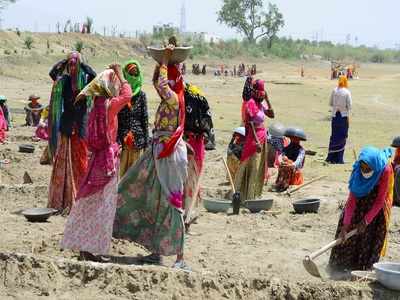Railways planning to increase MGNREGA use for migrant workers

PTI photo.
NEW DELHI: The Railways is planning to scale-up utilisation of MGNREGA for construction and repair of approach roads for level crossings and railway stations to mitigate the employment crisis among migrant workers who have returned to their villages because of the coronavirus pandemic, officials said Thursday.
Railway Minister Piyush Goyal, who discussed the plan at a high-level meeting, has asked the Zones to increase work allotted under the government's flagship rural job guarantee programme and explore ways to hire workers under the scheme, they said.
The Railways has asked Zones to prepare a list of labourers against the kind of work they can be involved in.
While the Railways has made use of the scheme in some district like Katihar in Bihar, Warangal in Andhra Pradesh, Udaipur in Rajasthan, Madurai in Tamil Nadu, Allahabad in Uttar Pradesh and Malda West Bengal, it has largely depended on private skilled labour in other areas, the officials said.
"We are exploring opportunities to generate jobs under MNREGA for migrants who have come back to the villages. It will be a win-win situation for all," said railway spokesperson DJ Narain.
A record 4.89 crore persons belonging to 3.44 crore households sought work under the Mahatma Gandhi National Rural Employment Guarantee Act in May this year, according to government data and the chasm between demand and supply seems to be widening with more and more migrant workers returning home.
Officials said since these workers are largely unskilled, they can be hired to construct and maintain approach roads for level crossings, cleaning silted water-ways, trenches, drains along track, construction and maintenance of approach roads to railway stations, repair of earthwork to the existing railway embankments/cuttings, clearing vegetation growth and take on activities like plantation at extreme boundary of railway land.
"Work under MNREGA for the Railways had not really taken off because the work would be far from the villages, being concentrated in urban areas. There are no railway tracks close Read More – Source
[contf] [contfnew] ![]()
times of india
[contfnewc] [contfnewc]



